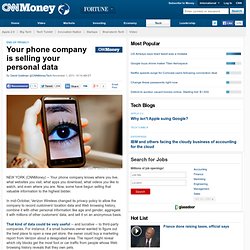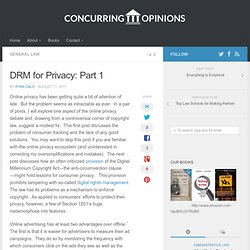

DPI & Phorm in US. Facebook tracking is under scrutiny. In recent weeks, Facebook has been wrangling with the Federal Trade Commission over whether the social media website is violating users' privacy by making public too much of their personal information.
Far more quietly, another debate is brewing over a different side of online privacy: what Facebook is learning about those who visit its website. Facebook officials are now acknowledging that the social media giant has been able to create a running log of the web pages that each of its 800 million or so members has visited during the previous 90 days. Web privacy tools to warn of internet tracking cookies. 14 November 2011Last updated at 16:24 The technologies will help users manage how much sites know about who they are Internet users will receive a warning if sites do not respect their privacy thanks to new tools being developed by the web's standards setting body. The World Wide Web Consortium (W3C) wants to help users control how their personal data is managed.
It is designing controls to shield personal data and reveal when sites do not honour privacy requests. The W3C now wants users, browser makers and businesses to help finish and implement the specifications. "Users have the feeling they are being being tracked and some users have privacy concerns and would like to solve them," said Dr Matthias Schunter from IBM who chairs the W3C group drawing up the Do Not Track technologies. Co-ordination The working group is defining software specifications that will: "Currently websites need to implement all these different protocols," he said. Anonymity tools. Phone carriers sell personal data. NEW YORK (CNNMoney) -- Your phone company knows where you live, what websites you visit, what apps you download, what videos you like to watch, and even where you are.

Now, some have begun selling that valuable information to the highest bidder. In mid-October, Verizon Wireless changed its privacy policy to allow the company to record customers' location data and Web browsing history, combine it with other personal information like age and gender, aggregate it with millions of other customers' data, and sell it on an anonymous basis.
That kind of data could be very useful -- and lucrative -- to third-party companies. For instance, if a small business owner wanted to figure out the best place to open a new pet store, the owner could buy a marketing report from Verizon about a designated area. The report might reveal which city blocks get the most foot or car traffic from people whose Web browsing history reveals that they own pets. That's a step further than Verizon goes. Social Science res on DPI. HULU Sued for SuperCookies. Analytics company KISSmetrics and Web video site Hulu.com have been hit with another privacy lawsuit over their alleged use of "supercookies" to track people. The lawsuit is the third against KISSmetrics since July, when it emerged that the company was using ETag technology to track users even when they deleted their cookies. Hulu also is facing a separate lawsuit for allegedly working with KISSmetrics, as are two dozen other Web companies. This latest action, filed on behalf of four Texas residents -- Susan Couch, Cristina Garza, Concepcion Jauregui, and Silviana Moncada -- alleges that KISSmetrics and Hulu violated the federal wiretap law, computer fraud law, various state laws and a privacy law that applies specifically to video rental records.
"Defendants' activities caused both economic harm and non-economic harm," the consumers allege in papers filed on Wednesday in U.S. District Court for the Central District of California. DRM for Privacy: Part 1. Online privacy has been getting quite a bit of attention of late.

But the problem seems as intractable as ever. In a pair of posts, I will explore one aspect of the online privacy debate and, drawing from a controversial corner of copyright law, suggest a modest fix. This first post discusses the problem of consumer tracking and the lack of any good solutions. You may want to skip this post if you are familiar with the online privacy ecosystem (and uninterested in correcting my oversimplifications and mistakes). The next post discusses how an often criticized provision of the Digital Millennium Copyright Act—the anti-circumvention clause—might hold lessons for consumer privacy. Online advertising has at least two advantages over offline.1 The first is that it is easier for advertisers to measure their ad campaigns. One of the more lucrative forms of targeting is known as behavioral or online preference marketing. Enter the Wall Street Journal’s What They Know series. Privacy Policies. There is no such thing as anonymous online tracking.
A 1993 New Yorker cartoon famously proclaimed, "On the Internet, nobody knows you're a dog.
" The Web is a very different place today; you now leave countless footprints online. You log into websites. You share stuff on social networks. You search for information about yourself and your friends, family, and colleagues.